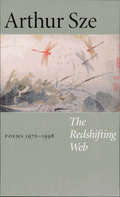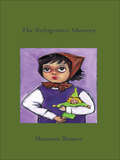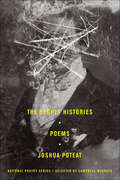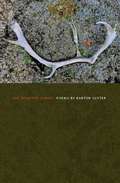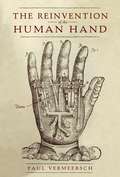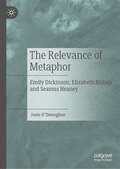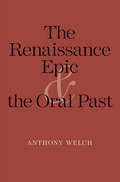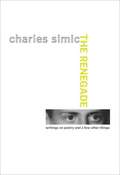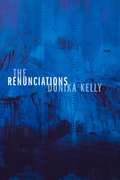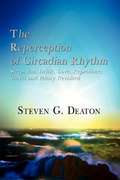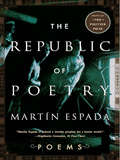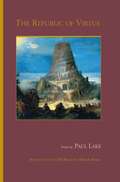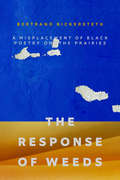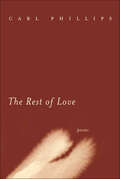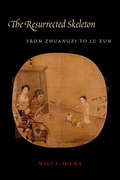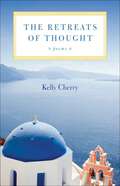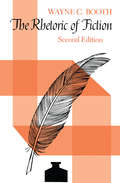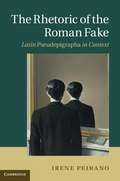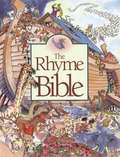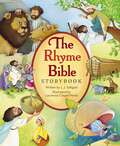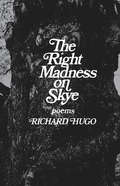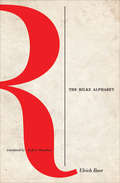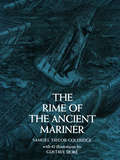- Table View
- List View
The Redshifting Web
by Arthur SzeThis collection spans more than a quarter century of published work, including selections from five previous award-winning books, and makes available for the first time the full range of Sze's remarkable poetry. Through the startling juxtaposition of images, Sze reveals the interconnectedness, the interdependency of things and ideas, always with an ear attuned to pitch and cadence.
The Refrigerator Memory
by Shannon BramerThe Refrigerator Memory is an exuberant, strangely funny celebration of sadness.With fable-like miniature stories and short lyric poems, Shannon Bramer creates a world littered with stolen pears and prosthetic arms and inhabited by Kindness scientists and hot-air-balloon operators. The poems invoke a world of childhood delights and demons in the context of grown-up fears and appetites: heartbreak, loss, jealousy and old-fashioned sibling rivalry. You'll find the hopelessly misunderstood Love the Clown (never goes out without his red wig) and Noni, a forlorn young man who can't stop crying.But while sadness plays a starring role, the true hero of the collection is the imagination; its transformative powers warm widows and drunken gods and designated mourners. You won't forget The Refrigerator Memory: the icebox cometh to warm your heart.
The Regret Histories: Poems
by Joshua PoteatThis powerful and provocative new installment of poetry is a recipient of the 2014 National Poetry Series Prize, as chosen by Campbell McGrath.The National Poetry Series’s long tradition of promoting exceptional poetry from lesser-known poets delivers another outstanding collection of poetry by Joshua Poteat.Through an investigation of the haunted spaces where history collides with the modern southern American landscape, The Regret Histories explores themes of ruin and nostalgia, our relationship to a collective past, and the extraordinary indifference of time to memory.For thirty years, the National Poetry Series has discovered many new and emerging voices and has been instrumental in launching the careers of poets and writers such as Billy Collins, Mark Doty, Denis Johnson, Marie Howe, and Sherod Santos.
The Reindeer Camps
by Barton SutterA winner of the Minnesota Book Award in fiction, poetry, and non-fiction, Barton Sutter's latest collection details life on the Canadian border, presents portraits of northern plants and animals, rejoices in marriage, and traces the ancient ways of Siberian reindeer herders. The late Bill Holm called it "unlike anything Sutter (or anyone else) has done before." Sutter's poetry reminds us that other cultures have survived for millennia by living closer to the ground.Born in 1949, Barton Sutter was raised in Minnesota and Iowa. He retired from the University of Wisconsin-Superior in 2011 and now lives in Duluth, Minnesota.
The Reindeer Camps (American Poets Continuum)
by Barton SutterA winner of the Minnesota Book Award in fiction, poetry, and non-fiction, Barton Sutter's latest collection details life on the Canadian border, presents portraits of northern plants and animals, rejoices in marriage, and traces the ancient ways of Siberian reindeer herders. The late Bill Holm called it "unlike anything Sutter (or anyone else) has done before." Sutter's poetry reminds us that other cultures have survived for millennia by living closer to the ground.Born in 1949, Barton Sutter was raised in Minnesota and Iowa. He retired from the University of Wisconsin-Superior in 2011 and now lives in Duluth, Minnesota.
The Reinvention of the Human Hand
by Paul VermeerschPaul Vermeersch's new poems give a present-day voice to primitive song, and restore to us a dawn-time severity that cuts through modern evasions. They go beyond sophistication to reveal the passionate and suffering animal within. The Reinvention of the Human Hand is a poetry of the human body's experience, of a primal being that struggles to assert itself, or perhaps just survive, in a world of metals, plastics, electronics. Here is the most far-reaching work yet by the acclaimed author of Burn, The Fat Kid, and Between the Walls. Vermeersch has always gone in search of understanding. Now his discoveries speak of a human world exhausted by its divorce from an animal past, terrified of retreating into early places it never truly left, astonished by the forgotten possibilities disclosed there.From the Trade Paperback edition.
The Relevance of Metaphor: Emily Dickinson, Elizabeth Bishop and Seamus Heaney
by Josie O'DonoghueThis book considers metaphor as a communicative phenomenon in the poetry of Emily Dickinson, Elizabeth Bishop and Seamus Heaney, in light of the relevance theory account of communication first developed by Dan Sperber and Deirdre Wilson in the 1980s. The first half of the book introduces relevance theory, situating it in relation to literary criticism, and then surveys the history of metaphor in literary studies and assesses relevance theory’s account of metaphor, including recent developments within the theory such as Robyn Carston’s notion of ‘the lingering of the literal’. The second half of the book considers the role of metaphor in the work of three nineteenth- and twentieth-century poets through the lens of three terms central to relevance theory: inference, implicature and mutual manifestness. The volume will be of interest to students and scholars working in literary studies, pragmatics and stylistics, as well as to relevance theorists.
The Renaissance Epic and the Oral Past
by Anthony WelchThis book offers a close survey of the changing audiences, modes of reading, and cultural expectations that shaped epic writing in the sixteenth and seventeenth centuries.According to Anthony Welch, the theory and practice of epic poetry in this period--including little-known attempts by many epic poets to have their work orally recited or set to music--must be understood in the context of Renaissance musical humanism. Welch's approach leads to a fresh perspective on a literary culture that stood on the brink of a new relationship with antiquity and on the history of music in the early modern era.
The Renaissance: Studies in Art and Poetry
by Walter Horatio PaterA discussion of Renaissance art and poetry from a 19th-century author with scholarly annotations.
The Renegade: Writings on Poetry and a Few Other Things
by Charles SimicSimic was born in Belgrade in 1938 and his childhood was marked by war. By 1954 he was in Chicago. By 1959 he was a published poet, and after a degree from New York U. he published the first of over 60 books. In time Simic (literature, U. of New Hampshire) the refugee was Simic the US Poet Laureate. His intuitive understanding of the bizarre has remained with him throughout, and this collection of writings reveals some of the reasons why this unique trait has helped to make him one of the great twentieth and twenty-first century poets. He explains attraction, reflection, rule-making, devotion, utopianism, marginalization and the heart of the poet along with the moments in his life that shaped his mind and spirit, and critiques the works of authors ranging from Christopher Marlow to Emily Dickenson, Edwin Arlington Robinson, Robert Creeley, and Zbigniew Herbert. Annotation ©2009 Book News, Inc., Portland, OR (booknews.com)
The Renunciations: Poems
by Donika KellyAn extraordinary collection of endurance and transformation by the award-winning author of BestiaryThe Renunciations is a book of resilience, survival, and the journey to radically shift one’s sense of self in the face of trauma. Moving between a childhood marked by love and abuse and the breaking marriage of that adult child, Donika Kelly charts memory and the body as landscapes to be traversed and tended. These poems construct life rafts and sanctuaries even in their most devastating confrontations with what a person can bear, with how families harm themselves. With the companionship of “the oracle”—an observer of memory who knows how each close call with oblivion ends—the act of remembrance becomes curative, and personal mythologies give way to a future defined less by wounds than by possibility.In this gorgeous and heartrending second collection, we find the home one builds inside oneself after reckoning with a legacy of trauma—a home whose construction starts “with a razing.”
The Reperception of Circadian Rhythms
by Steven T. DeatonThe author describes it as: "Sleep, Eat, Drink, Love, Reproduce, Tavel and Peotry Revisited
The Republic of Poetry: Poems
by Martín EspadaThe eighth collection by "the Pablo Neruda of North American authors" (Sandra Cisneros) was a finalist for the 2007 Pulitzer Prize. In his eighth collection of poems, Martín Espada celebrates the power of poetry itself. The Republic of Poetry is a place of odes and elegies, collective memory and hidden history, miraculous happenings and redemptive justice. Here poets return from the dead, visit in dreams, even rent a helicopter to drop poems on bookmarks.
The Republic of Virtue
by Paul LakeThe Republic of Virtue by Paul Lake, is unique in their range and exquisite in their craftsmanship. Some of the poems in this collection, with constant and remarkable clarity, boldly dissect some of the crucial, underlying philosophical and political questions of western civilization, often focusing on how language is used to subvert the truth and how radical idealism can often lead to violence and terror.
The Response of Weeds: A Misplacement of Black Poetry on the Prairies (Crow Said Poetry)
by Bertrand BickerstethBertrand Bickersteth’s debut poetry collection explores what it means to be Black and Albertan through a variety of prisms: historical, biographical, and essentially, geographical. The Response of Weeds offers a much-needed window on often overlooked contributions to the province’s character and provides personal perspectives on the question of Black identity on the prairies. Through these rousing and evocative poems, Bickersteth uses language to call up the contours of the land itself, land that is at once mesmerizing as it is dismissively effacing. Such is Black identity here on this paradoxical land, too.
The Rest of Love: Poems
by Carl PhillipsThe light, for as far asI can see, is that of any number of late afternoons I remember still: how the lightseemed a bell; how it seemed I'd been livinginsider it, waiting - I'd heard all about that one clear note it gives. --from "Late Apollo III"In The Rest of Love, his seventh book, Carl Phillips examines the conflict between belief and disbelief, and our will to believe: Aren't we always trying, Phillips asks, to contain or to stave off facing up to, even briefly, the hard truths we're nevertheless attracted to? Phillips's signature terse line and syntax enact this constant tension between abandon and control; following his impeccable interior logic, "passionately austere" (Rita Dove, The Washington Post Book World), Phillips plumbs the myths we make and return to in the name of desire--physical, emotional, and spiritual.The Rest of Love is a 2004 National Book Award Finalist for Poetry.
The Resurrected Skeleton: From Zhuangzi to Lu Xun (Translations from the Asian Classics)
by Wilt IdemaThe early Chinese text Master Zhuang (Zhuangzi) is well known for its relativistic philosophy and colorful anecdotes. In the work, Zhuang Zhou ca. 300 B.C.E.) dreams that he is a butterfly and wonders, upon awaking, if he in fact dreamed that he was a butterfly or if the butterfly is now dreaming that it is Zhuang Zhou. The text also recounts Master Zhuang's encounter with a skull, which praises the pleasures of death over the toil of living. This anecdote became popular with Chinese poets of the second and third century C.E. and found renewed significance with the founders of Quanzhen Daoism in the twelfth century.The Quanzhen masters transformed the skull into a skeleton and treated the object as a metonym for death and a symbol of the refusal of enlightenment. Later preachers made further revisions, adding Master Zhuang's resurrection of the skeleton, a series of accusations made by the skeleton against the philosopher, and the enlightenment of the magistrate who judges their case. The legend of the skeleton was widely popular throughout the Ming dynasty (1368–1644), and the fiction writer Lu Xun (1881–1936) reimagined it in the modern era. The first book in English to trace the development of the legend and its relationship to centuries of change in Chinese philosophy and culture, The Resurrected Skeleton translates and contextualizes the story's major adaptations and draws parallels with the Muslim legend of Jesus's encounter with a skull and the European tradition of the Dance of Death. Translated works include versions of the legend in the form of popular ballads and plays, together with Lu Xun's short story of the 1930s, underlining the continuity between traditional and modern Chinese culture.
The Retreats of Thought: Poems (Voices of the South)
by Kelly CherryKelly Cherry, who studied philosophy in graduate school at the University of Virginia, has never lost her deep love of the subject; The Retreats of Thought takes the reader through the philosophical domain. What do we really know of our world? Why is there anything at all? What is time? What is a person? What is mind? What are goodness and beauty? What does the artist seek? These and other problems are shrewdly examined in Cherry’s passionate, skeptical, witty, and sometimes wry poems. Cherry places herself in the pragmatic tradition of philosopher Charles Sanders Peirce but admits to Platonic longings.
The Rhetoric of Fiction
by Wayne C. BoothThe first edition of The Rhetoric of Fiction transformed the criticism of fiction and soon became a classic in the field. One of the most widely used texts in fiction courses, it is a standard reference point in advanced discussions of how fictional form works, how authors make novels accessible, and how readers recreate texts, and its concepts and terms—such as "the implied author," "the postulated reader," and "the unreliable narrator"—have become part of the standard critical lexicon. For this new edition, Wayne C. Booth has written an extensive Afterword in which he clarifies misunderstandings, corrects what he now views as errors, and sets forth his own recent thinking about the rhetoric of fiction. The other new feature is a Supplementary Bibliography, prepared by James Phelan in consultation with the author, which lists the important critical works of the past twenty years—two decades that Booth describes as "the richest in the history of the subject."
The Rhetoric of the Roman Fake
by Irene PeiranoPrevious scholarship on classical pseudepigrapha has generally aimed at proving issues of attribution and dating of individual works, with little or no attention paid to the texts as literary artefacts. Instead, this book looks at Latin fakes as sophisticated products of a literary culture in which collaborative practices of supplementation, recasting and role-play were the absolute cornerstones of rhetorical education and literary practice. Texts such as the Catalepton, the Consolatio ad Liviam and the Panegyricus Messallae thus illuminate the strategies whereby Imperial audiences received and interrogated canonical texts and are here explored as key moments in the Imperial reception of Augustan authors such as Virgil, Ovid and Tibullus. The study of the rhetoric of these creative supplements irreverently mingling truth and fiction reveals much not only about the neighbouring concepts of fiction, authenticity and reality, but also about the tacit assumptions by which the latter are employed in literary criticism.
The Rhyme Bible Storybook
by ZondervanThe Rhyme Bible Storybook brings classic Bible stories from the Old and New Testaments to life, retold in rhyme so that children are enthusiastic to read along, excited to read aloud, and, most importantly, eager to remember their favorite Scripture verses.Storybook Bibles are wonderful ways for young children to begin their journey into knowing and loving God&’s Word. The Rhyme Bible Storybook:Is ideal for children ages 4-8Features eye-catching art throughoutIncludes classic Bible stories from the Old and New Testaments told in read-aloud rhymeIs a popular a gift from parents and grandparents for birthdays, Christmas, Easter, and First CommunionsThe Rhyme Storybook Bible provides a unique and appealing way for children to hear God&’s truths, with its rhyming text and vibrant illustrations.
The Right Madness on Skye: Poems
by Richard HugoIn an essay on Richard Hugo, the poet James Wright called him "one of the precious few poets of our age . . . who has, and sustains, an abiding vision." Hugo took that vision to Skye with him: he makes Scottish history, legends, and "triggering towns" his own in these new poems, just as he has earlier done in poems of the American West. And in making them his own, he makes them our own as well. He continues to be, in Wright's words, "a great poet, true to our difficult life." In September of 1977 Richard Hugo and his family went to live for several months on the Isle of Skye, off the coast of Scotland. One of the results of that experience is this new and impressive volume of poems.
The Rilke Alphabet
by Ulrich BaerThe renowned Rilke scholar brings the poet&’s work to life for modern readers through 26 essays, each devoted to a single word found in his writings. Ulrich Baer&’s The Rilke Alphabet explores the enduring power of one of the world&’s greatest poets, a visionary who saw that even the smallest overlooked word could unlock life&’s mysteries. With deep insight and love for Rilke&’s language, Baer examines twenty-six words that are not merely unexpected in his work, but problematic—even scandalous. Through twenty-six evocative essays, Baer sheds new light on Rilke&’s creative process and his deepest thoughts about life, art, politics, sexuality, love, and death. The Rilke Alphabet shows how the poet&’s work can be a guide to life even in our contemporary world. Whether it is a love letter to frogs, a troubling—though brief—infatuation with Mussolini, a sustained reflection on the Buddha, or the impassioned assertion that freedom must be lived in order to be known, Rilke&’s thoroughly original writings pull us deeply into life. Baer&’s decades-long experience as a scholar, translator, and editor of Rilke&’s writings allows him to reveal unique aspects of Rilke&’s work. The Rilke Alphabet will surprise and delight Rilke fans, and deepen every reader&’s sense of the power of poetry to penetrate the mysteries of our world.
The Rime of the Ancient Mariner
by Gustave Doré S. T. ColeridgeGustave Dore's magnificent engravings for The Rime of the Ancient Mariner are among the later works of the great French illustrator. The intensely evocative poem provided Doré with the long-awaited opportunity to convey limitless space on a gigantic scale, and he exploited the poem's fantastic range of atmosphere to the limits of its possibilities. The terrifying space of the open sea, the storms and whirlpools of an unknown ocean, the vast icy caverns of Antarctica, the hot equatorial sea swarming with monsters, all of the amazing visual elements that make Coleridge's masterpiece one of the most exciting and most memorable poems in the English language are unforgettably engraved in Doré's plates.This edition reproduces all of the plates to perfection, in their original size. The illustrations and the text of the poem appear on facing pages, so that the imaginative kinship of Doré and Coleridge is delightfully evident on every page: the illustrations capture all the moods of the poem in their full intensity, bringing the images evoked by the words into clear visual focus. Unabridged and slightly rearranged republication of the 1878 American edition. Text slightly amended to conform to the authoritative 1834 edition of the poem.
